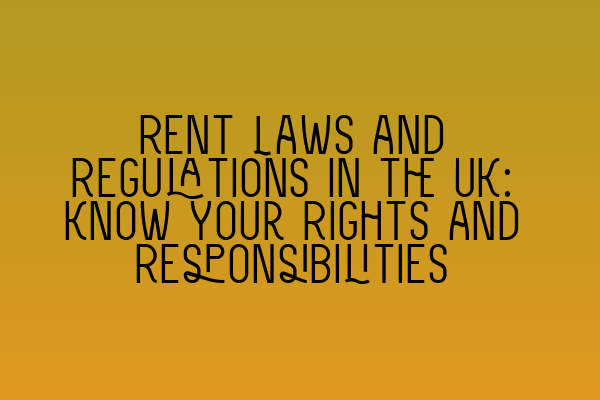Rent Laws and Regulations in the UK: Know Your Rights and Responsibilities
As a tenant or a landlord in the UK, it is essential to have a clear understanding of the rent laws and regulations in order to protect your rights and fulfill your responsibilities. This guide aims to provide you with comprehensive information on the topic.
The Importance of Knowing Rent Laws
Rent laws are designed to ensure fairness and protect the interests of both tenants and landlords. By familiarizing yourself with these laws, you can prevent potential disputes and ensure a smooth and harmonious tenancy.
It is crucial to note that rent laws may vary depending on the country (England, Scotland, Wales, or Northern Ireland) and the type of tenancy (assured shorthold tenancy, regulated tenancy, etc.). Therefore, it is essential to consult the specific regulations applicable to your location.
Key Rent Laws and Regulations
1. The Housing Act 1988: This legislation defines the different types of tenancies and sets out the rights and obligations of both tenants and landlords. It also establishes the procedures for eviction and rent increases.
2. Assured Shorthold Tenancies (ASTs): ASTs are the most common type of tenancy in England and Wales. They provide tenants with a legal right to occupy a property for a fixed term, usually six to twelve months. At the end of the term, landlords can issue a Section 21 notice to regain possession, provided certain conditions are met.
3. Rent Deposit Schemes: Landlords in the UK are required to protect their tenants’ deposits in a government-approved deposit protection scheme. This ensures that tenants can get their deposit back at the end of the tenancy, subject to any deductions for damages.
4. Rent Increases: Landlords must follow specific procedures when increasing the rent. In most cases, they need to provide notice to the tenant and cannot increase the rent more than once a year.
5. Repairs and Maintenance: Landlords have a legal obligation to maintain the property in a safe and habitable condition. Tenants should promptly report any necessary repairs to the landlord or letting agent to ensure a timely resolution.
6. Right to Rent Checks: Landlords must conduct right to rent checks to verify the immigration status of prospective tenants. Failure to comply with these checks can result in hefty fines.
Tenant Rights and Responsibilities
Tenants also have specific rights and responsibilities under UK rent laws. It is essential to be aware of these in order to assert your rights and fulfill your obligations:
1. Right to a safe and habitable property: Landlords are responsible for ensuring that the property meets certain safety standards, such as providing a valid Gas Safety Certificate and maintaining electrical installations in a safe condition.
2. Right to protection against unfair eviction: Tenants cannot be evicted without proper legal procedures, such as serving a valid notice. If you believe you are facing an unfair eviction, seek legal advice immediately.
3. Right to fair rent: Landlords must not charge excessive rent or engage in unfair rental practices. If you suspect your rent is unreasonably high, consider seeking advice from a rent officer or an organization that provides free or low-cost housing advice.
4. Responsibility to pay rent and bills: Tenants are responsible for paying rent on time and covering utility bills as agreed upon in the tenancy agreement.
5. Responsibility to report repairs: Tenants should promptly report any necessary repairs or maintenance issues to the landlord or letting agent to ensure a safe and habitable living environment.
6. Responsibility to keep the property clean and undamaged: Tenants should keep the property clean and avoid causing intentional damage to the premises. This includes taking proper care of fixtures, fittings, and appliances provided by the landlord.
Conclusion
Being knowledgeable about rent laws and regulations in the UK is essential for both tenants and landlords. Understanding your rights and responsibilities can help you navigate the rental process smoothly and prevent disputes. If you are unfamiliar with the specific regulations applicable to your location, it is advisable to seek legal advice or consult professional services such as SQE Property Law & Land Law.
For further information on related topics, you may find the following articles useful:
- SQE 1 Practice Exam Questions
- SQE 1 Practice Mocks FLK1 FLK2
- SQE 2 Preparation Courses
- SQE 1 Preparation Courses
- SRA SQE Exam Dates
